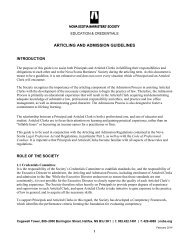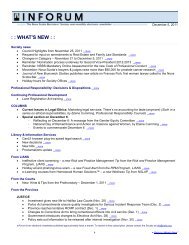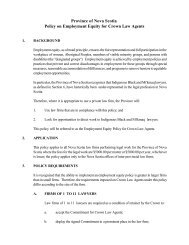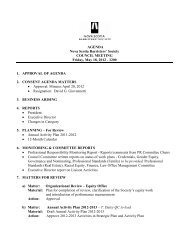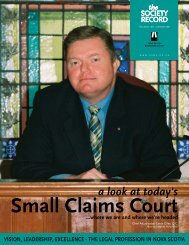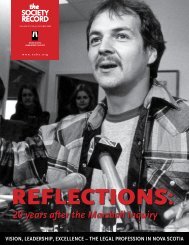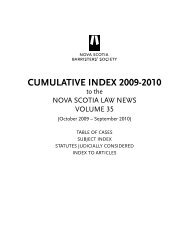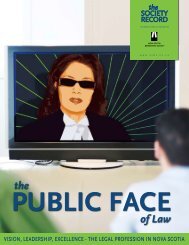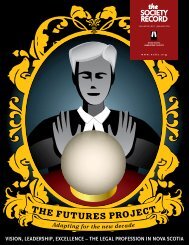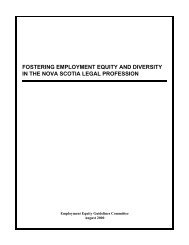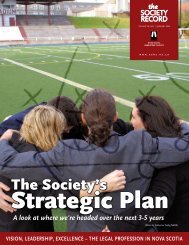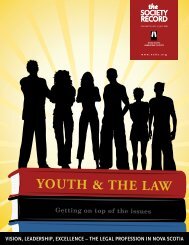SR Vol 24 No 5, October 2006 - Nova Scotia Barristers' Society
SR Vol 24 No 5, October 2006 - Nova Scotia Barristers' Society
SR Vol 24 No 5, October 2006 - Nova Scotia Barristers' Society
- No tags were found...
You also want an ePaper? Increase the reach of your titles
YUMPU automatically turns print PDFs into web optimized ePapers that Google loves.
ThePresident’sViewCourse; one which is meant to allow the student to gently easeinto the practice of law and have some type of clue as to what heor she will be facing when meeting with a client for the first timeand actually taking carriage of a file. The exams require preparationand knowledge in order to be able to pass them (as opposed to the“Citadel Hill” experience).Despite the fact that the program is now significantly better than itwas in the past, the <strong>Society</strong> continues to look at ways in which toimprove it. At this time, the Credentials Committee of the <strong>Society</strong>is reviewing the Skills Course in order to recommend suggestionsto Council as to how it can be improved: by streamlining certainprocesses, focusing on other issues, and the like.The Discipline Process has taken on an entirely different format fromyears ago. One of the most significant developments was openingup formal hearings to the public. Although there was a great deal ofdiscussion on the subject by Council, and a certain reluctance fromthe membership, it was ultimately agreed upon [by Council] that theonly true way for the public to appreciate that the process was workingin their interest was to actually allow them access to the proceedings.I think it is fair to state that this decision has not been abused, and, ifanything, has made the process much more transparent, overall.Irecently had the honour and pleasure of speaking to the first yearlaw class at Dalhousie Law School. When I walked through thefront doors of the Weldon Law Building, it brought back fondmemories (mainly) of what it was like when I first entered there. Italso gave me an opportunity to reminisce about what has transpiredsince then, especially in light of the fact that I have a Law Schoolclass reunion scheduled shortly (the number of years since I havegraduated unfortunately escapes me at this particular time).Many people, including lawyers, do not have a proper appreciationof the mandate of the <strong>No</strong>va <strong>Scotia</strong> Barristers’ <strong>Society</strong>. It is specificallylegislated in the new Legal Profession Act that our primary obligationis to govern in the public interest. It is interesting to note both thechanges as well as the similarities between now and the time when Iwas first admitted to the Bar.One of the most notable differences is the Bar Admission Course.When I took that course as a prerequisite to being admitted to theBar, it involved a six-week experience, some of which was spent onCitadel Hill on a nice sunny fall day making pictures out of theclouds in the sky. The instructors of the course did their best to teachyou what was required in order to pass the Bar exam. Having saidthat, if the questions and answers were not specifically spoon fed toyou, the instructor would do things — such as lift a watch up in theair as he was reading a certain section of the materials — to alert youto the fact that this would be included as one of the exam questions.Needless to say, this was more of a vacation than an actual education.Little was gleaned from this process, and it did little or nothing toprepare you for becoming a lawyer.Today, we have a much more enhanced skills-based Bar AdmissionThe entire professional responsibility process was revamped a numberof years ago. When I sat on Bar Council several years ago, there wasDiscipline Subcommittee A and Discipline Subcommittee B. Whenone Committee referred a matter on to a formal hearing, it was simplysent over to the other Committee, which would constitute a panelto hear the complaint. These days, there is an independent formalHearing Committee which operates totally separate and distinct fromthe Complaints Investigation Committee (CIC). Other significantchanges include allowing <strong>Society</strong> staff to dismiss complaints (wherewarranted) without it going to the CIC, and an appeal process whichhas been implemented for complainants who are not happy with thedecision of staff and wish to have it reviewed.These are but a few examples of the many changes the <strong>Society</strong> hasgone through [over the past few years] in working towards fulfillingits legislative mandate of protecting the public. Having said that,many of the new programs and processes — though implementedin the interest of the public — have also had the added benefit ofassisting lawyers. One should not view those two concepts as mutuallyexclusive. On the contrary, there is a considerable amount of overlap.Very often, the initiation of a new project intending to protect thepublic will also help lawyers in their day to day practice.Council intends to continue to advance the various items on theAnnual Plan which will ultimately result in the desired effect of bothprotecting the public and providing tools and assistance to lawyers intheir practice.Philip J. Star, Q.C.<strong>October</strong> <strong>2006</strong>



